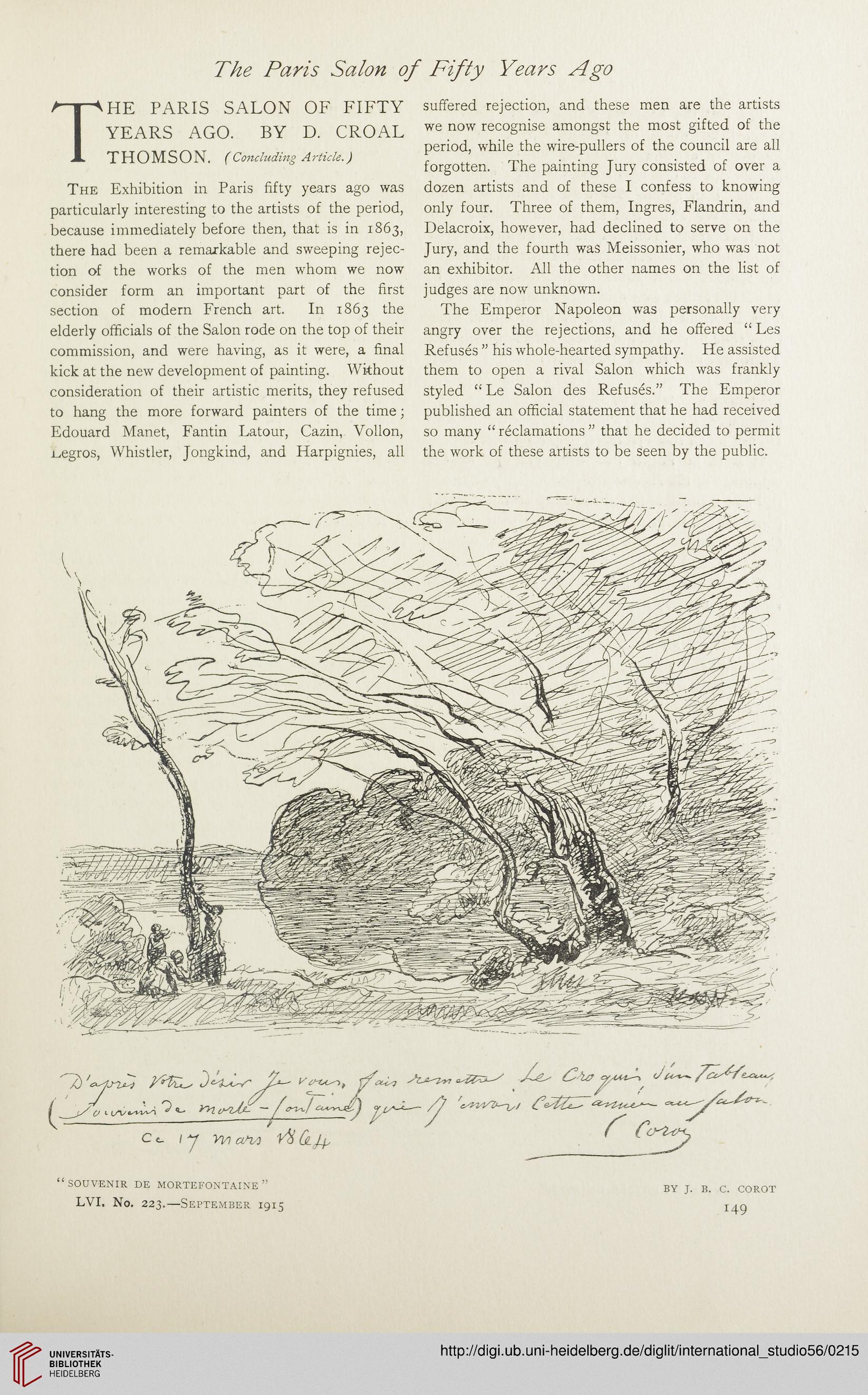The Paris Salon of Fifty Years Ago
THE PARIS SALON OF FIFTY
YEARS AGO. BY D. CROAL
THOMSON. (Concluding A rticle. J
The Exhibition in Paris fifty years ago was
particularly interesting to the artists of the period,
because immediately before then, that is in 1863,
there had been a remarkable and sweeping rejec-
tion of the works of the men whom we now
consider form an important part of the first
section of modern French art. In 1863 the
elderly officials of the Salon rode on the top of their
commission, and were having, as it were, a final
kick at the new development of painting. Without
consideration of their artistic merits, they refused
to hang the more forward painters of the time;
Edouard Manet, Fantin Latour, Cazin, Vollon,
Luegros, Whistler, Jongkind, and Harpignies, all
suffered rejection, and these men are the artists
we now recognise amongst the most gifted of the
period, while the wire-pullers of the council are all
forgotten. The painting Jury consisted of over a
dozen artists and of these I confess to knowing
only four. Three of them, Ingres, Flandrin, and
Delacroix, however, had declined to serve on the
Jury, and the fourth was Meissonier, who was not
an exhibitor. All the other names on the list of
judges are now unknown.
The Emperor Napoleon was personally very
angry over the rejections, and he offered “ Les
Refuses ” his whole-hearted sympathy. He assisted
them to open a rival Salon which was frankly
styled “ Le Salon des Refuses.” The Emperor
published an official statement that he had received
so many “ reclamations ” that he decided to permit
the work of these artists to be seen by the public.
“souvenir de mortefontaine ”
LVI. No. 223.—September 1915
BY J. B. C. COROT
149
THE PARIS SALON OF FIFTY
YEARS AGO. BY D. CROAL
THOMSON. (Concluding A rticle. J
The Exhibition in Paris fifty years ago was
particularly interesting to the artists of the period,
because immediately before then, that is in 1863,
there had been a remarkable and sweeping rejec-
tion of the works of the men whom we now
consider form an important part of the first
section of modern French art. In 1863 the
elderly officials of the Salon rode on the top of their
commission, and were having, as it were, a final
kick at the new development of painting. Without
consideration of their artistic merits, they refused
to hang the more forward painters of the time;
Edouard Manet, Fantin Latour, Cazin, Vollon,
Luegros, Whistler, Jongkind, and Harpignies, all
suffered rejection, and these men are the artists
we now recognise amongst the most gifted of the
period, while the wire-pullers of the council are all
forgotten. The painting Jury consisted of over a
dozen artists and of these I confess to knowing
only four. Three of them, Ingres, Flandrin, and
Delacroix, however, had declined to serve on the
Jury, and the fourth was Meissonier, who was not
an exhibitor. All the other names on the list of
judges are now unknown.
The Emperor Napoleon was personally very
angry over the rejections, and he offered “ Les
Refuses ” his whole-hearted sympathy. He assisted
them to open a rival Salon which was frankly
styled “ Le Salon des Refuses.” The Emperor
published an official statement that he had received
so many “ reclamations ” that he decided to permit
the work of these artists to be seen by the public.
“souvenir de mortefontaine ”
LVI. No. 223.—September 1915
BY J. B. C. COROT
149




